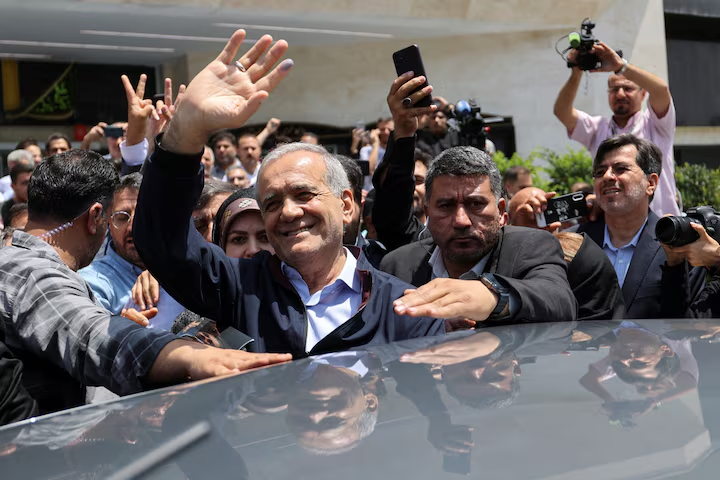In a surprising turn of events, moderate candidate Massoud Pezeshkian has secured a place in the run-off for Iran’s presidential election, narrowly beating hardliner Saeed Jalili in Friday’s first round of voting. The 69-year-old cardiac surgeon, lawmaker, and former health minister will face Jalili in a second round on July 5, as neither candidate achieved the required majority of 50% plus one vote to win outright.

Pezeshkian’s campaign has stood out in an election dominated by hardliners, with the moderate candidate advocating for women’s rights, increased social freedoms, cautious détente with the West, and economic reform. His stance offers a stark contrast to the fiercely anti-Western position of many of his rivals, who more closely align with Supreme Leader Ayatollah Ali Khamenei’s views.
The moderate candidate’s success in the first round has sparked renewed interest in the election, particularly among young and disillusioned voters hungry for change. However, Pezeshkian faces significant challenges in the run-off, including the need to attract supporters of current hardline parliament speaker Mohammad Baqer Qalibaf, who finished third in the initial vote.

Getty Images
Despite his reformist leanings, Pezeshkian remains faithful to Iran’s theocratic rule and has pledged not to confront the country’s powerful security hawks and clerical rulers. His campaign gained momentum after receiving endorsements from reformists led by former President Mohammad Khatami and appointing former Foreign Minister Mohammad Javad Zarif as his foreign policy adviser.
Pezeshkian’s moderate stance on foreign policy and his support for reviving the 2015 nuclear deal have drawn criticism from hardliners. Supreme Leader Khamenei implicitly referred to Zarif’s appointment, warning that “anyone who is attached to America will not be a good colleague for you.”
If elected, Pezeshkian has promised to foster a pragmatic foreign policy and ease nuclear tensions with the West. However, under Iran’s dual system of clerical and republican rule, ultimate power in shaping key state policies rests with Khamenei, leading many voters to question Pezeshkian’s ability to fulfill his campaign promises.
Throughout his career as a lawmaker since 2008, Pezeshkian has been critical of the clerical establishment’s suppression of political and social dissent. He has also been a vocal supporter of ethnic minority rights, being of Azeri descent himself. However, he has acknowledged the limits of his potential authority as president, particularly concerning political prisoners.
Pezeshkian’s personal history includes service as both a combatant and physician during the Iran-Iraq war in the 1980s. He served as health minister from 2001 to 2005 under reformist President Mohammad Khatami. Tragically, Pezeshkian lost his wife and one of his children in a car accident in 1994, raising his surviving children alone.
As the run-off election approaches, all eyes will be on Pezeshkian to see if he can maintain his momentum and attract enough support to overcome his hardline opponent. The outcome of this election could have significant implications for Iran’s domestic policies and its relationships with the international community, particularly regarding the nuclear deal and social reforms.
Reuters



